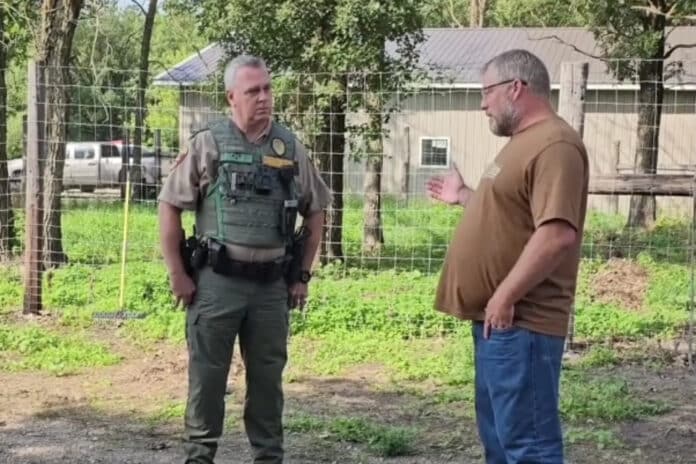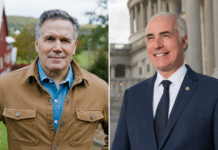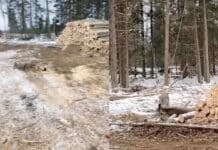
A former sheriff who runs a deer farm in northwestern Minnesota is raising concerns over what he describes as unconstitutional overreach by the Department of Natural Resources (DNR).
“Deer farmers have been under attack by Democrat legislators for about five years,” former Kittson County Sheriff Steve Porter told Alpha News.
Porter believes recent legislative changes allowing access to private deer farms by conservation officers infringe upon his constitutional rights.
The changes gave the Minnesota DNR exclusive authority over the regulation of farmed white-tailed deer in an effort to better control the spread of chronic wasting disease (CWD) to the wild deer population. Deer farmers believe they are being unfairly blamed for CWD because of “some bad apples” in the industry, Minnesota Deer Farmers Association President Scott Fier told the Star Tribune in an interview, noting that the new laws also prohibit the establishment of new deer farms and will phase out existing farms.
“There’s been a longstanding concern with the deer farming industry that there’s a bias within the DNR against their industry,” Tim Spreck of the Deer Farmers Association told lawmakers in April. “We’re very concerned that allowing them to administer this program would be something that would be very challenging for them to do without prejudice.”
Erik Simonson, a lobbyist for the Minnesota Deer Hunters Association, said during the April hearing that the organization supports “better management” of deer farms because CWD poses a threat to the state’s half-a-billion-dollar deer hunting industry.
“One of our top priorities is better management over some of these farms and we think that this moves us in the right direction,” he said.
Porter said the latest legislative changes are very concerning. “They changed the law last session and now it says a game warden (conservation officer), who has powers of arrest, can now go on privately owned deer farms at will. Officers don’t even need suspicion of a crime being committed to enter private property,” he remarked. He told Alpha News that he voiced his dissent during the bill’s consideration, citing his constitutional concerns.
He also said he fears that non-compliance could result in revoked licenses for those who own deer farms. This is why, after initially resisting, Porter eventually allowed conservation officers to inspect his property earlier this month and was accompanied by Sen. Nathan Wesenberg, R-Little Falls, and Rep. John Burkel, R-Badger. A video of the encounter shows a conservation officer confirming that Porter’s “permit will not be renewed” if he doesn’t allow them to inspect his property by the end of the year.
Porter agrees that business owners should be subject to inspections related to licensed activities but contested the involvement of licensed law enforcement officers without proper legal authorization.
“When licensed officers come onto a farm without a search warrant, that’s unconstitutional,” Porter emphasized, noting property owners have a right to demand a search warrant. He categorized the new law as “illegal” and recounted stories of individuals allegedly facing intrusion. “One example is of a woman who had an officer come into her house and sit at her kitchen table after she asked them to leave her property,” he shared.
Porter explained that the DNR officials who conduct the inspections also are filming them, since they are wearing body cameras, which raises privacy concerns for some farmers. He said he asked for copies of the footage taken on his property but was refused because the information is part of a civil investigation.
Porter said that since it was on his property, he would be the one being investigated and therefore should still be able to receive the videos.
“Inspections are fine. But you can’t send a licensed officer. They’re basically saying, ‘Your farmers don’t have those rights,'” Porter said.
The DNR explained the recent legal changes in a statement to Alpha News.
“During the 2023 session, the Minnesota Legislature provided the Minnesota Department of Natural Resources with sole oversight authority of the state’s white-tailed deer facilities,” the DNR said. “Previously, the DNR and the Minnesota Board of Animal Health had concurrent authority to regulate farmed white-tailed deer.”
The DNR also defended the constitutionality of the new law.
“As required by state statute, DNR conservation officers must annually inspect farmed white-tailed deer facilities. There is nothing in this statutory direction that is inconsistent with the Minnesota or U.S. Constitution. The DNR has conducted numerous inspections of white-tailed deer farms this summer, as we did previously in conjunction with the Board of Animal Health,” the agency said.
“All inspections are being undertaken in accordance with federal and state law. These inspections are part of Minnesota’s effort to protect the state’s wild deer population from diseases, such as chronic wasting, that may spread from farmed white-tailed deer to the wild population.”














